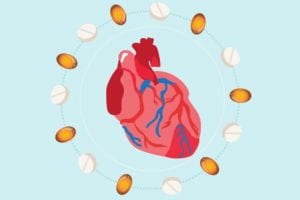

If you’re taking omega-3 supplements in an effort to protect your heart, new research suggests that you might be wasting your money. An off-shoot of the same study found that vitamin D won’t reduce your heart disease risk, either — nor will it substantially lower your cancer risk.
JoAnn Manson, MD, of Brigham and Women’s Hospital-Harvard Medical School in Boston, presented these key findings from the VITAL trial during the American Heart Association’s Scientific Sessions last week. The research was simultaneously published in the New England Journal of Medicine (NEJM).
The VITAL trial enrolled nearly 26,000 men (age 50 and up) and women (age 55 and up). For the omega-3 part of the study, half of the participants were given 1 g of fatty acids from fish oil once a day; the other half got a placebo. For the vitamin D intervention, half took 2,000 IUs of vitamin D daily and the rest got a placebo.
Trial participants were followed for about five years. During that time, 793 who had been taking vitamin D developed cancer, versus 824 in the placebo group. Meanwhile, 386 of those who took omega-3 supplements had a major cardiovascular event (like a heart attack or stroke) compared to 419 of those on the placebo.
Two separate papers were published in NEJM reporting on the two arms of the VITAL trial. The one that focused on omega-3s concluded that this supplement “did not result in a lower incidence of major cardiovascular events or cancer than placebo.” The paper on vitamin D came to a nearly identical conclusion.
Still, there were some secondary outcomes worth noting. Although taking vitamin D didn’t substantially reduce the chance of getting cancer, those who took it were less likely to die from the disease.
Mason also said that while omega-3s didn’t protect against cardiovascular disease overall, they did seem to have an impact on who had a heart attack: “Omega-3s reduce total [heart attack] by 28 percent, with greatest reductions in those with low dietary fish intake and in African-Americans.”
In other words, if you don’t eat a lot of fish or you’re African-American, fish oil supplements might still have some value for you, but it’s not totally clear because other studies have not come to the same conclusions.
Bottom line: Unless additional studies or more detailed analyses of the VITAL trial come to different conclusions, there doesn’t seem to be a strong reason to take vitamin D or fish oil supplements for heart disease or cancer.
That doesn’t mean these supplements may not be helpful for other reasons — your doctor might recommend you take vitamin D to help your bone density, for example; omega-3s may have value as an anti-inflammatory supplement for people with arthritis. That said, it’s always a good idea to get as many nutrients as possible from your diet, as opposed to supplements.
Keep Reading
- 6 Vitamins and Supplements for Inflammatory Arthritis That Doctors Approve
- How to Eat a Healthy Diet with Fibromyalgia
- This Is What Happens to Your Heart Disease Risk if You Eat Most of Your Calories After 6 PM





